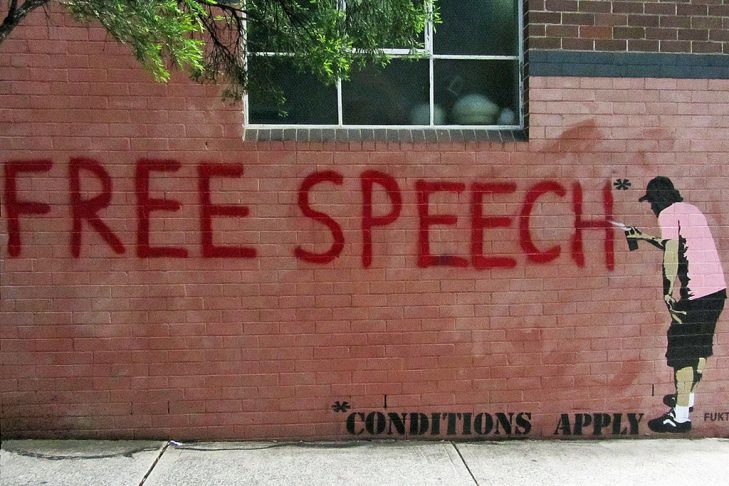In the midst of covering one of the most contentious presidential elections in United States history, Politico reporter Hadas Gold was besieged with personalized anti-Semitic images and neo-Nazi comments on social media. Gold was not the only Jewish journalist on the receiving end of disturbing threats. A colleague of hers was attacked online for a profile she wrote on Melania Trump; Jeffrey Goldberg of The Atlantic, Jonathan Weisman of The New York Times, CNN’s Jake Tapper and several others were also targeted.
Related
- 3/15/2017, 7:30 pm
On March 15, Gold will participate in a panel called “Cyber Trolls, Death Threats and the First Amendment.” She will be joined by Mary Anne Franks, a professor at the University of Miami Law School and the vice president and legislative and technology policy director of the Cyber Civil Rights Initiative, a nonprofit organization that fights online abuse and discrimination, and Ari Ezra Waldman, an associate professor of law and the director of the Innovation Center for Law and Technology at New York Law School. Lisa Green, a lawyer and former on-air legal analyst for NBC News, will moderate the discussion. A part of the Jewish Community Center of Greater Boston’s “Jonathan Samen Hot Buttons, Cool Conversations Discussion Series,” this panel will explore the power of social media and the nuances of freedom of speech and the First Amendment.
In a call with JewishBoston, Franks pointed out: “One of the most important facets of this whole conversation is that the concept of ‘freedom of speech’ is really misunderstood. People confuse freedom of speech generally with the First Amendment. There is a tendency to say if Twitter or Facebook takes action against an abuser, it is censorship or a violation of the First Amendment. As a matter of law, that is simply false; the First Amendment applies only to state action, government action, laws or punitive measures like putting someone in jail or fining them.”
In a separate conversation with JewishBoston, Waldman explained that First Amendment protection does not prevent a social-media company from regulating its own outlets; for example, Twitter should be monitoring its own platform when speech veers into hate. It’s a distinction he anticipates will be the basis of robust discussion during the panel.
When it comes to the latest developments in online speech, lawyers like Franks and Waldman often find themselves in uncharted territory. “Over the last decade, there have been more cases involving internet speech and [social media] platform responsibilities,” said Waldman. “What is new is the awesome power these platforms have: They control what we see, what order we see them in and when we see them. They have the power to determine the world of our information and that hasn’t existed before.” These new circumstances prompted Waldman to found the Tyler Clementi Institute for CyberSafety at New York Law School, which includes a clinic staffed by admitted attorneys and legal students who provide counsel to cyber-harassment victims free of charge.
The impact of anti-Semitic harassment has the same “silencing effect” on victims of revenge pornography. Through her work at Cyber Civil Rights Initiative fighting nonconsensual revenge pornography, Franks found “the consequence of this abusive behavior, facilitated by technology, is that it causes the silence of women and girls disproportionately. What that means is we’re left with professional and educational spaces where women and girls are not participating.”
Waldman said victims of online harassment, more often than not, tend to be women and LGBTQ people. “It’s important for these platforms to prevent and weed out anti-Semites, neo-Nazis and homophobes,” he said. “They need to take their terms of service seriously when haters use their platforms for targeted attacks. I’m looking forward to talking about LGBTQ harassment in Boston and how the law and platforms can work to solve this problem.”
Gold mentioned the anti-Semitic messages and doctored images she received didn’t feel customized. “I felt like I was getting a message that has been sent to other people,” she said. “They just put my name and photo in a template.” She emphasized that after her virtual harassment, she was determined not to change her reporting habits. As for the power of platforms to regulate hate speech, Gold said she “tends to follow the line of less self-censorship and more free speech. But that line is a fine one. Many of these platforms, which are also private entities, are powerful and can regulate hate speech.”
Nevertheless, Gold observed: “I feel like we’re in an ironic place with regard to anti-Semitism. For the first time, we have a Jewish family close to the White House, and to have this happening all at the same time is a unique situation.”
Register here for the “Cyber Trolls, Death Threats and the First Amendment” panel discussion on March 15.
Never miss the best stories and events! Get JewishBoston This Week.




